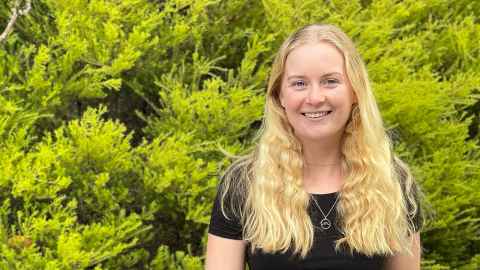Taryn Smith
Taryn has found her GIS and Environmental Science studies are a perfect blend of discovering the natural world and how to safeguard it.

Programme: Bachelor of Science - Majoring in Geographic Information Science and Environmental Science
“I’ve always had a passion for the environment; growing up with hobbies that constantly had me in the outdoors made me want to learn about and explore the physical world around me. The more I progressed in my high-school studies, I found that I also had a passion for technology, problem solving and understanding the role that humans play within the environment, particularly sustainability. Studying both GIS and Environmental Science at The University of Auckland perfectly blended these ideas together.
“The evolution of technology we have access to in today’s world has continued to fascinate me. Pursuing the GIS major allowed me to see the world in a different way and provided a new level of comprehension around the world’s spatial patterns, relationships, trends and changes. In my studies, I have been able to understand the various ways we can analyse and manipulate spatial information across a broad range of topics, and to also provide a backbone for decision making and innovative future proof solutions. Learning the theoretical and practical skills behind the ways we can integrate GIS and Environmental Science into everyday business, policy and communication both locally in New Zealand and globally, has provided me with a stepping stone towards a career that can make a difference.
I have been able to understand and investigate the world’s complex natural and social processes, the problems we face into the future, and most importantly how we can be the solution.
“I love that the programme is heavily focused on teaching you the practical skills and giving you the opportunity to communicate your learning through various modes, not just traditional assignment styles. It has allowed me to feel more confident in my degree when pursuing jobs after graduation, with a more solid foundation of understanding topics and software. I also appreciate the range of topics we cover throughout the degree, as it really gives you the chance to pinpoint the areas you are most passionate about or interested in.
“Even if you have many passions, you’ll be able to gain new insights and ways of showcasing them through learning and understanding GIS, as there are so many opportunities to use creativity and merge your own ideas and interests into practical assignments. It’s such a broad field and although the courses scratch the surface into each aspect, if there’s any software or technical skills you enjoy, I would encourage you to enhance them in your own time and supplement your learning that you receive in the programme - assignments often don’t have boundaries, and they let you explore and go outside the box.
“Even with the majority of my time at The University of Auckland being spent online, the virtual environment still allowed me to connect with other students, lecturers and tutors. We were always able to get in contact and ask questions, receiving a bunch of support. What I have appreciated most is the dedication of the educators (both tutors and lecturers) to better our learning, and helping us to achieve the best we each can.
“The Science Faculty also has many extracurricular activities, such as hackathons, quiz nights, clubs and career events, which are all super useful for making connections, friends or exploring your interests. I found that GIS is still a relatively niche field, and all of the students in the programme are friendly, helpful and engaged with learning and activities - which only makes it easier for you to get involved.
“I’ve used the science student services a lot - they always help me to know my way around enrolments, exams, degree planning and any other admin tasks that can be overwhelming at first. I’d also recommend CDES, who provide students with heaps of useful events, information and sessions to help with career planning, advice, making your CV, interview practice and more. They have helped me to find opportunities and companies I might be interested to work for in the future, tips to prepare for meeting employers and general advice that everyone should have moving through their studies. I’ve also used, and tutored, at the volunteer GIS helpdesk, which gives you a chance to meet people pursuing the same courses, get any extra help, or just a chance to chat each week about what's happening in class, assignments or general life.”
We're always looking for stories to share from our passionate Science students. If you have a story, we'd love to hear from you. Email science-web@auckland.ac.nz.